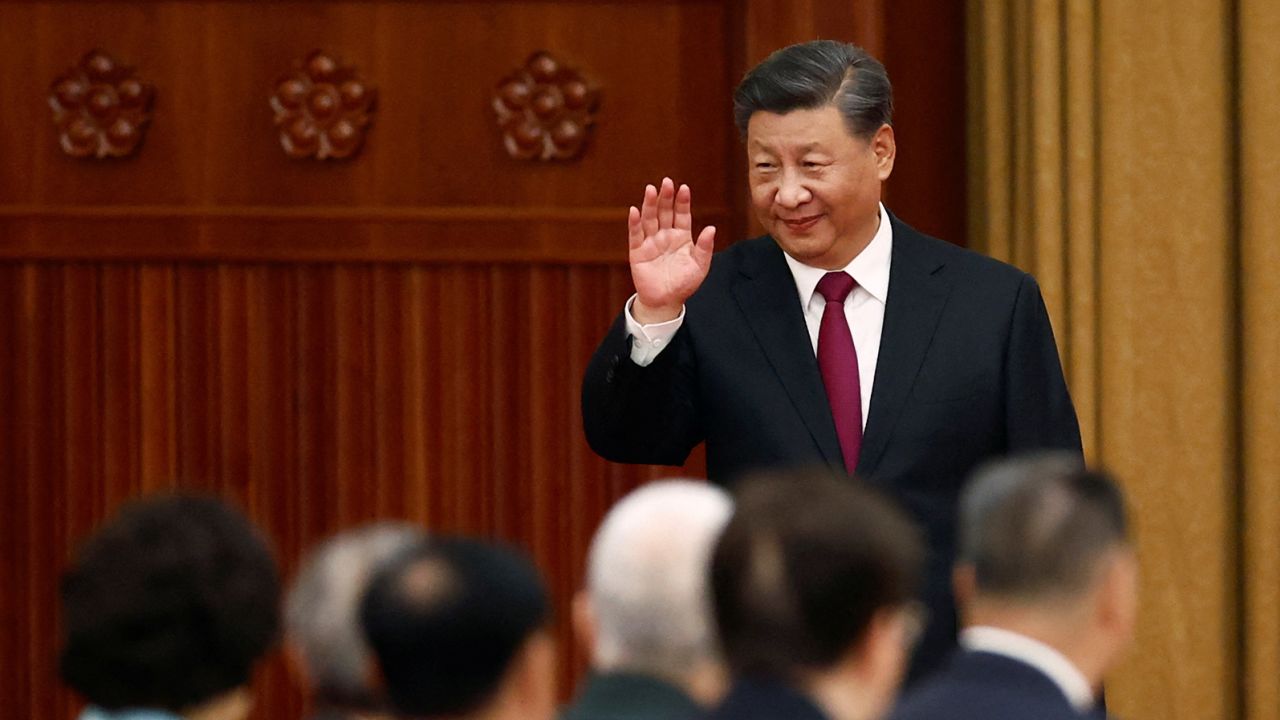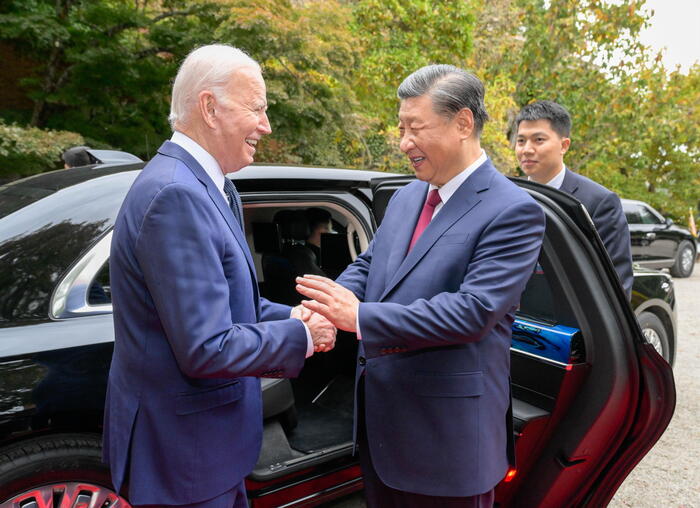What is the future of China under Xi Jinping?
4:18
(CNN Business) --
When Xi Jinping came to power a decade ago, China had just overtaken Japan to become the world's second-largest economy.
Since then, it has grown at a phenomenal rate.
With an average annual growth rate of 6.7% since 2012, China has experienced one of the fastest sustained expansions of any major economy in history.
In 2021, its GDP reached almost 18 trillion dollars, which represents 18.4% of the world economy, according to the World Bank.
China's rapid technological advances also made it a strategic threat to the United States and its allies.
It consistently pushes its American rivals out of historic leadership positions in sectors ranging from 5G technology to artificial intelligence.
Until recently, some economists predicted that China would become the world's largest economy by 2030, overtaking the United States.
But now, the situation looks much less promising.
As Xi prepares for his second decade in power, he faces a number of growing economic challenges, including the unhappiness of the middle class.
If he can't get the economy back on track, China faces a slowdown in innovation and productivity, combined with growing social unrest.
advertising
Asia's richest man sees China's growing isolation 1:16
"For 30 years, China was on a path that gave people great hope," said Doug Guthrie, director of China Initiatives at Arizona State University's Thunderbird School of Global Management, adding that now, " The country is in serious trouble."
Economic slowdown and strange dissidence
While Xi is one of the most powerful leaders China and its ruling Communist Party have ever seen, some experts say he can't take credit alone for the country's amazing progress.
"Xi's leadership is not the cause of China's economic boom," said Sonja Opper, a professor at Bocconi University in Italy who studies China's economy.
"Xi was able to capitalize on an ongoing entrepreneurial movement and the rapid development of a private (sector) economy that previous leaders had unleashed," she added.
Hostesses stand near images showing Chinese President Xi Jinping at an exhibition highlighting Xi's years as leader, part of the upcoming 20th Party Congress, on October 12, 2022 in Beijing, China.
Instead, in recent years, Xi's policies have caused major headaches.
Beijing's crackdown on the country's private sector, which began in late 2020, and its unwavering commitment to a zero-COVID policy, hit the economy and labor market hard.
"If anything, Xi's leadership may be responsible for slowing down the country's growth dynamics," Opper said.
More than $1 trillion of market value has been lost from Alibaba and Tencent, the crown jewels of China's tech industry, in the past two years.
Sales growth in the sector has slowed and tens of thousands of employees have been laid off, leading to a record youth unemployment rate.
The real estate sector also took a hit, which in turn hit some of the country's largest homebuilders.
The collapse of real estate, which accounts for up to 30% of GDP, caused widespread and rare dissent among the middle class.
Chinese President Xi Jinping waves as he arrives for a reception at the Great Hall of the People on the eve of China's National Day in Beijing, China, 30 September 2022.
Thousands of angry homebuyers have refused to pay their mortgages on stalled projects, fueling fears of systemic financial problems and forcing authorities to pressure banks and developers to calm the waters.
But that was not the only display of discontent this year.
In July, Chinese authorities violently dispersed a peaceful protest by hundreds of savers, who were demanding the return of their life savings from rural banks that had frozen those million-dollar deposits.
The banking scandal not only threatened the livelihood of hundreds of thousands of customers, but also brought to the fore the deteriorating financial health of China's smaller banks.
"Many middle-class people are disappointed with recent economic performance and disillusioned with the Xi government," said David Dollar, senior fellow at the John L. Thornton Center for China at the Brookings Institution.
According to analysts, the vulnerabilities in the financial system are the result of the country's runaway debt-driven expansion in the previous decade.
This would show that the model must change.
"China's growth during Xi's decade in power is largely attributed to the general economic approach taken by his predecessors, which focused on rapid expansion through investment, manufacturing and trade," said Neil Thomas, an analyst senior for China and Northeast Asia at Eurasia Group.
"But this model reached a point of significantly diminishing returns and increased economic inequality, financial debt and environmental damage," he said.
A new model is needed
While Xi is trying to change that model, he isn't doing it the right way, experts said, risking the future of China's businesses with tighter state controls.
The 69-year-old leader launched a harsh campaign to rein in "disorderly" private companies that were becoming too powerful.
He also seeks to redistribute wealth in society, under his goal of "common prosperity."
Xi expects a "new normal", where consumption and services become more important engines of expansion than investments and exports.
But, so far, these measures have pushed the Chinese economy into one of its worst economic crises in four decades.
Shoppers walk through the Taikoo Li Village shopping mall at Sanlitun in Beijing, China, Monday, May 30, 2022.
The International Monetary Fund recently cut its forecast for China's growth to 3.2% this year, marking a sharp slowdown from 8.1% in 2021. It would be the country's second-lowest growth rate in 46 years, only better than 2020, when the initial coronavirus outbreak hit the economy hard.
Under Xi, China has not only become more insular, but has also seen relations with the United States erode.
Her refusal to condemn Moscow's invasion of Ukraine and China's recent aggression against Taiwan could further alienate the country from Washington and its allies.
What are Xi's options?
Analysts say the current problems do not yet pose a major threat to the Xi government.
He is expected to win a third term in power, which is unprecedented at the Communist Party Congress that starts this Sunday.
The priorities laid out at the congress will also set China's trajectory for the next five years or even longer.
"It would probably take an economic catastrophe on the scale of the Great Depression to create levels of social unrest and popular protest that are a threat to Communist Party rule," said Thomas of Eurasia Group.
"Furthermore, growth is not the only source of legitimacy and support for the Communist Party, and Xi has increasingly polished the Communist Party's nationalist credentials to appeal to both patriotism and pocketbooks," he added.
But for China to return to high growth and innovation, Xi may have to reintroduce market-oriented reforms.
“If he was smart, he would liberalize things quickly in his third term,” Guthrie said.
Xi Jinping









/cloudfront-eu-central-1.images.arcpublishing.com/prisa/KMEYMJKESBAZBE4MRBAM4TGHIQ.jpg)


/cloudfront-eu-central-1.images.arcpublishing.com/prisa/EXJQILQR5QI7OMVRTERD7AEZAU.jpg)
